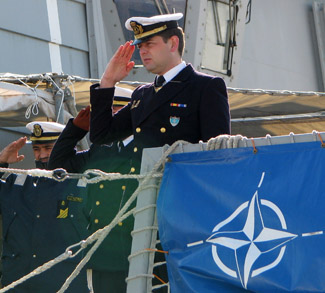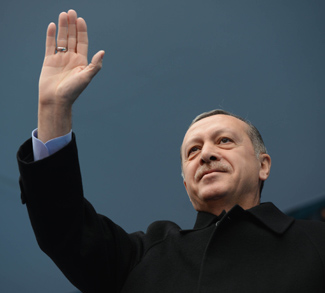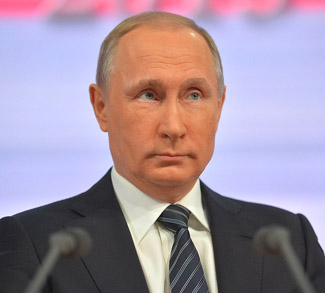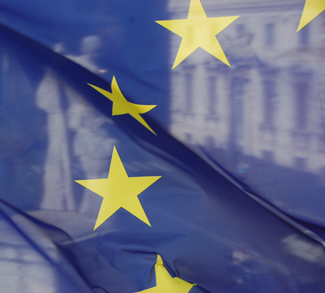The ceremonies to commemorate the centenary of the Battle of the Somme were a sombre reminder of Europe’s blood-soaked history. The ironic coincidence that they almost exactly coincided with the United Kingdom’s decision to leave the European Union will not have been lost on European leaders attending these events. The EU, after all, was devised to pacify Europe once and for all and make war between European countries impossible. As such, it has been one of the cornerstones of peace and stability in Europe, the other cornerstone being NATO.
But as the ramifications of the UK’s exit from the EU and the myriad potential problems, pitfalls, and divisions that this process could trigger – or once again force to the surface – begin to become clear, the question can be asked: how will this affect the relationship of NATO allies and the cohesion and stability of the Alliance? If the UK’s divorce from the EU becomes a messy and painful affair it will strain relations between the two and could spill over into the NATO realm. NATO’s integrity being vulnerable may sound far-fetched, but not long ago so too did the UK leaving the EU.
The United Divided
The interests of the EU are now to keep the rest of the bloc together and dissuade other member states with significant Euroskeptic movements from following the UK’s example. It is therefore probable that once the UK triggers Article 50 of the Treaty of Lisbon to officially begin the withdrawal process, and negotiate its new relationship with the EU, the latter will prove a tough negotiator as it will want to set an example that leaving comes at a cost.
The political reality is that, sadly, the UK paying a heavy price is now in the EU’s political interest. While some EU leaders like Angela Merkel have stated that there is no need to get nasty in the negotiations, others within the bloc have not been so conciliatory.
Rebuffing claims of prominent Leave campaigners regarding access to the common market, Dutch Foreign Minister Bert Koenders stated “it is very clear. You’re either in or you’re out. You can’t have the cake and eat it,” and even Merkel herself stated that the UK can’t “cherry-pick.” What most EU leaders agree on is that the UK should trigger Article 50 as soon as possible to begin the process of withdrawal to avoid a prolonged period of uncertainty and the negative financial, as well as political, consequences this entails.
Diplomatic Fallout Begins
The emergency meeting of foreign ministers from the EU’s six founding states – Belgium, France, Germany, Italy, Luxembourg and the Netherlands – following the UK referendum revealed impatience and diplomatic tensions with Britain. France is particularly impatient, and it is not only strictly EU issues that the French are raising but also the knock-on effects of Brexit. As a consequence of the UK voting to leave, the mayor of Calais wants changes to the deal which allows Britain to carry out immigration checks on the French side of the English Channel. Under the 2003 Le Touquet treaty, Britain can carry out checks in Calais to stop migrants trying to get to the UK.
Spain is also looking to jointly govern Gibraltar following the British vote. Gibraltar has been a British territory since 1713 and is a major point of contention in Anglo-Spanish relations. Spain has long claimed sovereignty over the enclave and this could be the chance the Spanish government has been waiting for.
Recognizing the complex diplomatic stumbling blocks facing Europe, US officials have weighed in to soothe fears on both sides of the Atlantic as the aftershocks of Brexit continue to rattle markets and governments. The reality is that a successful, secure, and united Europe is in the interests of all stakeholders in Euro-Atlantic security, and hence tensions within the collective have wide-ranging implications, not just for economics but also for security.
Tensions Transferred
The danger exists that strains caused by a painful and messy UK exit from the EU will have an impact on NATO relations. There are already, it could be argued, simmering tensions within the Alliance regarding Europe’s contribution to its capabilities with some members, particularly the U.S., accusing Europe of “free-riding.” As the UK is one of the few European Alliance members that actually spend the recommended 2 percent on defense, these tensions could be exacerbated should Brexit negotiations prove bitter.
The threat of European bickering turning into recriminations, or even hostility, was recognized by US Secretary of State John Kerry, who traveled to Europe and urged leaders “not to lose their head” and warned against anger leading to either side “cutting off their nose to spite their face”. These unprecedented political challenges come at a time when security conditions require NATO to present a strong and united front, as uncertainty and division could embolden opportunistic external forces to take advantage of such division.
More Europe, less NATO?
Another factor worth considering is that the traditional EU response to crisis has been calls for “more Europe,” as more cooperation and deeper integration are seen as a solution to tackling systemic problems. Many experts for example have long claimed that the euro surviving in the long run necessitates fiscal integration within the eurozone, because the strategy of kicking the can down the road through a series of mega bailouts has not solved the problem. The uncertainty that Brexit has created – combined with its implications for the EU’s legitimacy and ultimately its integrity – could see renewed calls for deeper integration of the remaining 27 members. Should the “more Europe” path be chosen, deeper integration would, presumably, also add impetus to the EU’s defense identity, currently in the form of the Common Security and Defence Policy or CSDP.
As the UK has been vehemently opposed to a CSDP, claiming it undermines NATO, any moves in that direction would increase the rift. The plausibility of this possibility must be viewed against the backdrop of political events in the United States. Should republican candidate Donald Trump – whose world view is similar to that of the more right-wing elements of the UK’s “Brexiteers,” as well as being scathing of Europe’s NATO contribution – become the next president, NATO could increasingly be made up of two camps. On the one hand its EU members moving towards deeper integration and a CSDP and, on the other, the US and the UK, who together bring the majority of NATO’s capability.
On balance and in summary, a look at the overall picture suggests European cooperation has reached a point where it can overcome a shock even as big as Brexit. Likewise, the U.S., the UK and EU Alliance members have continuously reaffirmed their commitment to their defense ties and NATO as the framework for same. Nevertheless, both sides in the long and extremely difficult UK exit negotiations that lie ahead will need to keep not only the particulars of the UK leaving the EU in mind, but also wider considerations, namely its impact on the unity of the West and the ultimate guarantor of that unity – NATO.
The opinions, beliefs, and viewpoints expressed by the authors are theirs alone and don’t reflect any official position of Geopoliticalmonitor.com.




